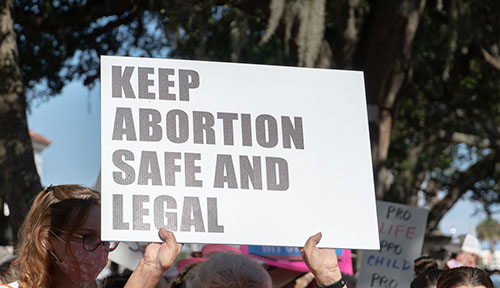
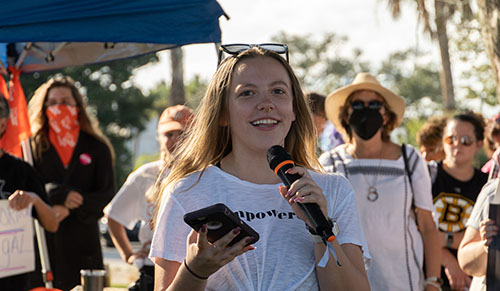
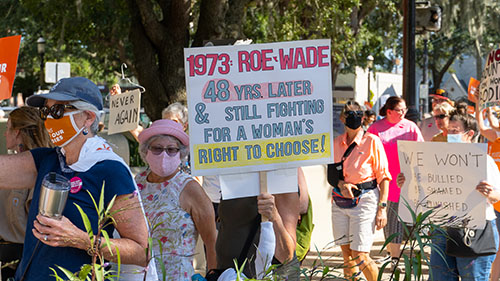
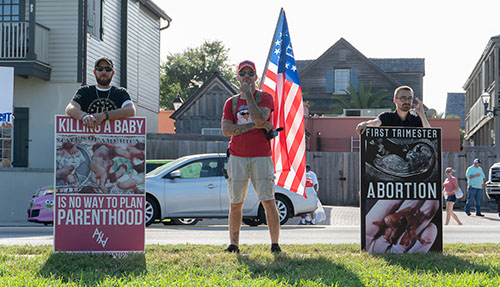
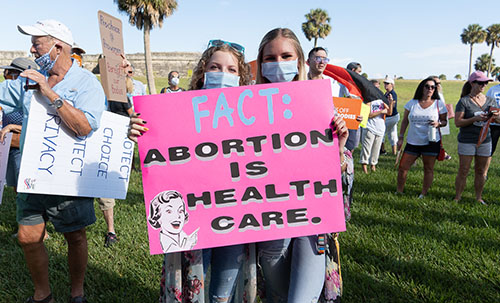
By Elysse DaVega
“Our body, our choice” rang loud as the motto of a “Bans Off Our Bodies” rally that took place in downtown St. Augustine on Saturday afternoon.
Over a hundred protesters, most of them women, gathered to garner support for abortion access and women’s bodily autonomy in general, as well as register and encourage voters. The rally was one of over 570 marches nationwide– part of a larger movement organized by Women’s March, a national women-led movement and long-time defender of reproductive rights.
Protesters and allies assembled at the Plaza de la Constitución at 4 p.m. They marched silently down St. George Street, eventually arriving at a voter registration booth in front of the Castillo San Marcos, where the rally would take place.
Counter protesters against abortion followed closely, some dressed in ultra-padded riot gear and helmets, some carrying signs. One sign read “A baby is not a female body part.”
The increased desire to protect and preserve Roe v. Wade comes only one month after Texas’ restrictive 6-week cutoff abortion law took effect. Even after pleas from abortion rights groups to block Texas’ new law, The Supreme Court declined.
On Sept. 22, Republican Florida state lawmaker Webster Barnaby proposed a similar law– the Florida Heartbeat Act— that would ban most abortions after a heartbeat is detected (which can be anywhere from 3 to 6 weeks), allow constituents to sue anyone that receives the operation after that time, and fine medical providers $10,000 for performing a post-heartbeat abortion.
Robin Dion, the chair of St. John’s Democratic Party, pointed out its parallels to Texas’ law, which she repeatedly called “cruel.”
“This bill will harm families, it will threaten the health of our most vulnerable families, and it will further divide our communities,” Dion said.
The bill, officially named HB 167, will be deliberated on in Florida’s upcoming legislative session in January. If the bill passes, Dion says, it would become law by next July.
To prevent this from happening, Dion encouraged and implored those present to use their vote in upcoming 2022 Florida elections.
“You must participate in the electoral process. We have to come together to elect people that are willing to protect your liberty and your freedom as a woman,” Dion said.
As of 2021, Florida possesses various restrictions on abortion, such as state-directed counseling designed to discourage abortion, mandatory ultrasounds, and mandatory notification and consent of parents for minors seeking the procedure.
According to the Guttmacher Institute, since 2010, states have increasingly adopted laws hostile to abortion rights.
“These bills remove safe and legal access to reproductive healthcare, instilling fear in individuals who don’t want to carry out their pregnancies,” said Julia Corrie, the president of the Flagler College Democrats, who gave a speech at the rally on Saturday. “Abortions are going to happen regardless, but this legislation forces people to use unsafe and potentially life-threatening alternatives.”
Trish Becker, a co-founder of the Women’s March Alliance of North Florida, says that even though abortion is legal, that doesn’t always mean it is accessible.
“There’s a lot of people that can’t just go down the road and go to a clinic. We don’t even have a clinic here,” Becker said. “We are not gonna let people feel shamed for doing something that is natural, that is a medical procedure. We are not gonna go back to the days of a coat hanger.”
Abortion advocates as young as 15 attended the rally, and one of them was Riley O’Keefe, who made national news in late May when her school yearbook photo was photoshopped to cover her chest. O’Keefe spoke out in support of women’s access to abortion, which she feels falls in the same category as her personal experience.
“We need to fight for this right because we live in a patriarchal society that thrives on the suppression of women,” O’Keefe said. “Abortion rights are just one way to control us.”
O’Keefe mentioned that Texas’ law as well as Barnaby’s proposal for Florida violate the precedent set by Roe v. Wade in 1973.
“If we let them get away with this, who knows how many more rights they will try to strip away?”

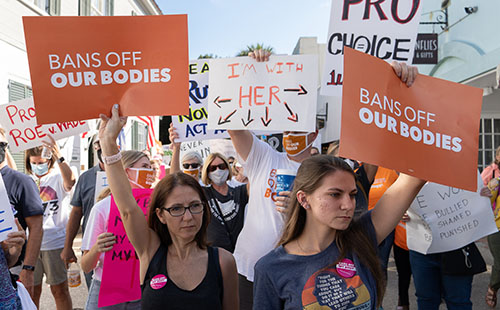

Be the first to comment on "St. Augustine’s Fight for Abortion Access: ‘Bans Off Our Bodies’"